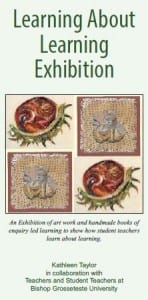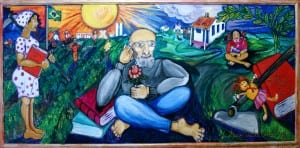To book a place, visit the conference website.
Conference Themes
•”Starting Out”: Researching my own practice – challenges and opportunities
• Engaging others to participate in change
• “Starting Over”: What would I do differently next time in my action research?
• “Am I doing it right?”: Reflecting on AR methods and methodologies
• Ethical dilemmas; balancing competing demands
• What does “collaboration” mean? How do we learn to collaborate?
• What can I learn from approaches to Action Research used in different settings?
• (How) Should we assess Action Research studies?
We invite contributions that explore all your engagements with, and concerns about Action Research, from initial ideas through to completed reports.
There will be dedicated sessions within the Programme for Regional Group meetings and also opportunities for meetings of Special Interest Groups across national boundaries (e.g. those interested in Palliative Care, Community Development, Inclusive Education, etc.)
Here are the slides from our session on analysing and interpreting data, in which we discussed:
- what ‘data’ is and can comprise of in action research (see Pine 2009, Chapter 11 for inspiration)
- what sort of data is useful for answering your practical and intellectual questions
- when and why we might not use certain kinds of data — in particular the uses and misuses of statistical measures
- what it means to make an ‘informed claim’ to knowledge when data are not complete or representative
- how to weave different kinds of data together or examine them with different methods
- what it means to ‘code’ texts, and different approaches for doing so.
Univ. of Lincoln
Main Building 0312
This presentation, which is both part of our Doctoral Study School and open to the public, will explore the significance of Brazilian thinker and activist Paulo Freire’s philosophy of education, drawing on a genealogy of his work from the early ’60s on adult literacy through the seminal 1968 text Pedagogy of the Oppressed. It will also look to later developments of Freire’s thinking as it evolved and self-critiqued. Here, his critique of the political naivety of some forms of so-called ‘liberatory’ or ‘emancipatory’ is especially instructive. Freire always emphasised the importance of praxis, the reciprocity of acute thinking and reflective action. The talk will thus look to his own impact on practical educational contexts and struggles. The first draws on work in an Irish educational context, exploring the hegemony of a certain kind of faith schooling and the attempt to critique these approaches from a more problem posing and multiculturalist standpoint. The second regards the increasing managerialist ideology of the educational sphere, and with specific reference to the growing pressures at university level, in Ireland and the UK, the talk will look to how Freire’s legacy might be understood. Particular attention will be paid to his work on the university (his University of Mexico lectures), as well as to the contested space of post-Freirean educational philosophy and theory, whether through Critical Pedagogy or otherwise.
Jones Irwin is a Lecturer in Philosophy and Education at St Patrick’s College, Dublin City University. He completed his PhD in Philosophy at University of Warwick in 1998. His recent work has focused on French philosophy (his monograph on Derrida and the Writing of the Body) and the problem of ethos in Irish schools. He has also been actively involved in the development of the new Ethics and Education curriculum strand in St Patrick’s College, Drumcondra, which seeks to provide a multi-denominational option for teacher students. In 2012, he published the monograph Paulo Freire’s Philosophy of Education: Origins, Developments, Impacts and Legacies. He was Visiting Fellow to Warwick Education Department in 2013, working with Professor Leslie Francis on a project on ‘Ethical and Comparative Religious Education – Tensions and Possibilities’. His most recent text explores the impact of Lacanian Psychoanalysis on Philosophy, and is published in 2014 (with Helena Motoh) as Žižek and His Contemporaries: On the Emergence of the Slovenian Lacan. He is currently writing a monograph on Radicalising Philosophy of Education: From Lyotard to Rancière.
 ‘Craftsmanship in any sphere is the means not just of achieving beauty but also of teaching truths to others’ (Ruskin in Cole 1992: 22).
‘Craftsmanship in any sphere is the means not just of achieving beauty but also of teaching truths to others’ (Ruskin in Cole 1992: 22).
This exhibition, curated by University of Lincoln EdD candidate Kathleen Taylor, ‘draws together work created by student teachers over many years at Bishop Grosseteste University. […] Their commentaries demonstrate the importance of seeing through a child’s eyes, and a child’s fascination for the world around them; their journey of enquiry and discovery where implicit cognitive experiences of learning how to learn are made explicit. The collection…represents the beauty of learning and raises implications for teaching. The intention is that of Ruskin’s, to create a National Store of teachers’ skills, knowledge and understanding of what it is to love learning and to teach for learning (Ruskin in Barnes 1985:43).’
&nsbp;
Exhibition venues and dates (2014)
Wednesday 29th January 2014 at 6.00pm – St Faith & St Martin Church of England Junior School, Lincoln
Monday 10th March 2014 at 6.00pm – St Chad’s Primary School, Dunholme
Wednesday 7th May 2014 at 6.00pm, All-Saints Community Primary School, Waddington
References
Barnes , J. (1985) Ruskin in Sheffield. The Ruskin Gallery, Sheffield Arts and Museums.
Cole, M. (1992) Be Like Daisies. St. Albans.Brentham Press.
For more information, please contact Kathleen Taylor (k.y.taylor@btinternet.com).
This conference on math education and social justice is far away, but it offers food for thought, particularly the workshops.
